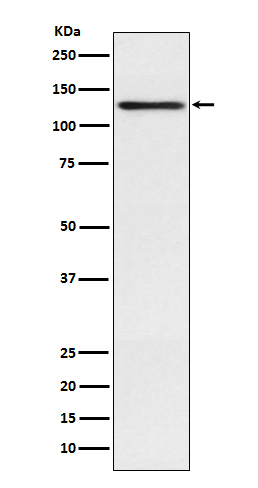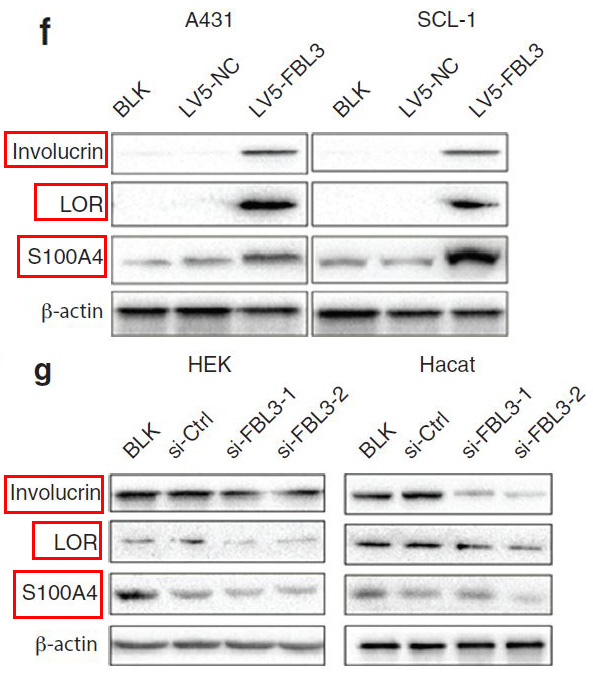

| WB | 咨询技术 | Human,Mouse,Rat |
| IF | 咨询技术 | Human,Mouse,Rat |
| IHC | 1/100-1/200 | Human,Mouse,Rat |
| ICC | 技术咨询 | Human,Mouse,Rat |
| FCM | 1/20-1/100 | Human,Mouse,Rat |
| Elisa | 咨询技术 | Human,Mouse,Rat |
| Aliases | Involucrin; IVL;;Involucrin |
| WB Predicted band size | Calculated MW: 68 kDa ; Observed MW: 120 kDa |
| Host/Isotype | Rabbit IgG |
| Antibody Type | Primary antibody |
| Storage | Store at 4°C short term. Aliquot and store at -20°C long term. Avoid freeze/thaw cycles. |
| Species Reactivity | Human,Rat |
| Immunogen | A synthesized peptide derived from human Involucrin |
| Formulation | Purified antibody in PBS with 0.05% sodium azide,0.05% BSA and 50% glycerol. |
+ +
以下是关于Involucrin抗体的参考文献示例(注:因无法实时访问数据库,以下为示例性描述,建议通过学术引擎核实具体文献):
1. **"Involucrin synthesis during normal and abnormal epidermal differentiation"**
- **作者**: Watt FM, Green H
- **摘要**: 该研究利用兔多克隆抗体分析人表皮中Involucrin的合成过程,揭示了其在角质形成细胞终末分化阶段的特异性表达,并探讨了其在表皮屏障形成中的作用。
2. **"Monoclonal antibodies to human epidermal involucrin: markers of differentiation"**
- **作者**: Banks-Schlegel S, Green H
- **摘要**: 开发了针对人Involucrin的单克隆抗体,通过免疫组化证实其在正常表皮、鳞状细胞癌及银屑病中的差异表达,为疾病诊断提供工具。
3. **"Altered involucrin expression in squamous cell carcinoma of the skin"**
- **作者**: Reano A et al.
- **摘要**: 使用Involucrin抗体对比正常皮肤与皮肤鳞癌组织,发现肿瘤中Involucrin表达显著降低,提示分化缺陷可能与肿瘤侵袭性相关。
4. **"Comparative study of commercial antibodies for involucrin detection"**
- **作者**: Smith JL et al.
- **摘要**: 评估了不同来源的Involucrin抗体在石蜡切片和冰冻切片的灵敏度与特异性,提出优化方案以提高实验可重复性。
**建议**:通过PubMed或Google Scholar搜索关键词“Involucrin antibody”、“involucrin immunohistochemistry”获取最新文献,重点关注表皮分化、皮肤病理学或抗体性能研究。
Involucrin is a key structural protein involved in epidermal differentiation, primarily expressed in the suprabasal layers of stratified squamous epithelia, such as the skin. It plays a critical role in forming the cornified envelope, a protective barrier by cross-linking with other proteins (e.g., loricrin, filaggrin) during terminal keratinocyte differentiation. As a marker of late-stage epidermal maturation, involucrin is widely used in dermatological research to study skin homeostasis, barrier dysfunction, and diseases like psoriasis, eczema, or squamous cell carcinoma.
Involucrin antibodies are essential tools for detecting and localizing this protein in tissues or cultured cells. They are commonly employed in techniques like immunohistochemistry (IHC), immunofluorescence (IF), and Western blotting to assess epidermal differentiation status or pathological changes. These antibodies help identify aberrations in involucrin expression, which may correlate with impaired barrier function, hyperproliferative disorders, or tumor progression. Monoclonal antibodies are preferred for specificity, while polyclonal versions may offer broader epitope recognition. Validation often includes testing on knockout models or siRNA-treated cells to confirm target specificity. Cross-reactivity with involucrin orthologs in animal models (e.g., mice, rats) is critical for translational studies. Researchers also utilize these antibodies to explore therapeutic interventions targeting epidermal repair or differentiation pathways. Proper antibody selection and validation are crucial, as inconsistent results may arise from epitope masking in formalin-fixed tissues or variations in post-translational modifications across species.
×